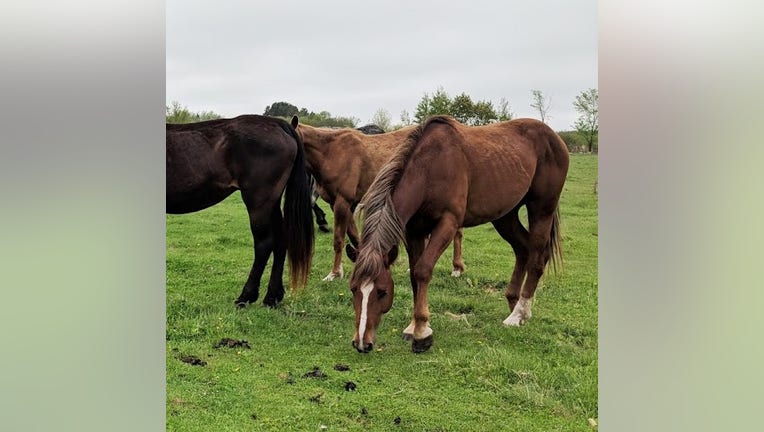Animal Humane Society helps rescue nearly 60 horses in 'poor shape' in northern Minnesota

Dozens of horses were rescued in northern Minnesota with the help of Animal Humane Society and a local rescue group. Credit: AHS
(FOX 9) - Nearly three dozen horses with serious health issues are recovering thanks to a local equine rescue group and Animal Humane Society in northern Minnesota.
According to AHS, staff received a call from a local equine rescue group back in May. The group asked AHS to investigate possible animal abuse and neglect on a Carlton County farm.
AHS found dozens of horses living on a rural farm near Wrenshall that appeared to be underfed and lacking appropriate veterinary care.
AHS Humane Agent Amanda Oquist counted a total of 60 horses, most of which were in "poor shape." Oquist visited the farm again in June with a veterinarian and veterinary technician to assess the horses’ health and take photographs for documentation.
"When determining if a horse is a healthy weight, we use something called the Henneke Body Condition scoring system," Oquist said in a report on the AHS website. "The veterinary staff and I agreed that the majority of horses were at a body condition score of 3 [optimal score is 5]."
According to AHS, hay and grass were available, but it was "clear the overwhelming number of horses was contributing to food competition and fighting."
Because so many of the horses were feral stallions, removing them safely and finding them new homes required help and expertise from equine rescue agencies. So far, 31 horses have been removed from the farm. According to AHS, most of the horses were either sold at auction or in a private sale to responsible owners. Others were surrendered to Minnesota Hooved Animal Rescue Foundation or Pony Tales Refuge and Rehab, two local nonprofit organizations dedicated to helping horses and other hooved animals in need.
Two of the horses surrendered to MHARF were humanely euthanized due to severe medical issues and another is suffering from pneumonia. Although he isn’t responding well to treatment, he’s receiving the compassionate veterinary care he deserves. Oquist believes personal illness and injury may be what led to neglect and poor breeding practices.
AHS, with the help of local law enforcement and the courts, could remove the animals as a last resort. However, according to AHS, the property owner has "been cooperative in reducing the number of horses under his care, making a seizure unnecessary."
Once the investigation is complete, the Carlton County attorney will decide if criminal charges are warranted. Oquist, the Carlton County Sheriff’s Office, and the owner agree that the goal is to have no more than 20 horses remaining on the property. To ensure this agreement is kept, Oquist will be visiting the farm twice a year.
For more information, click here.

